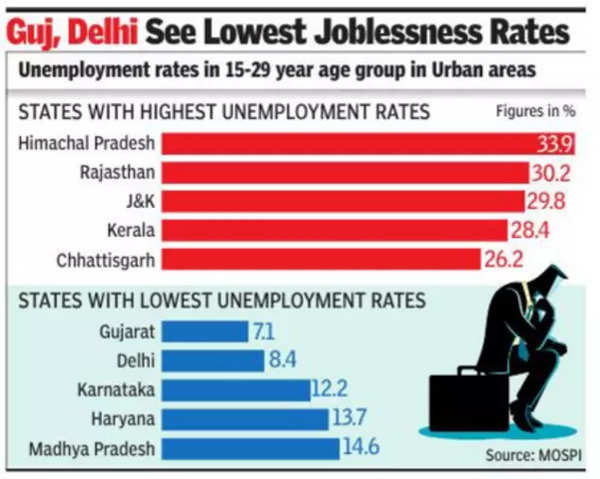[ad_1]
Out of the 22 states and Union territories covered by the survey, only two states – Gujarat and Delhi – recorded unemployment rates in single digits.Both states have recorded single digit unemployment rates in the past four quarters since July-September 2022.

The overall unemployment rate in the 15-29 years age group in the September quarter was at 17.3%, marginally slower than the 17.6% in the April-June quarter of the fiscal year and lower than the 18.5% in the year-ago period.
Among males in the 15-29 years age group, Rajasthan had the highest unemployment rate at 27.7%, followed by Himachal Pradesh at 25.3% and Chhattisgarh at 24.9%. The overall males’ joblessness rate for this age group during the September quarter was at 15.5% – slightly lower than the 15.9% recorded in the April-June quarter of the current fiscal year.
The joblessness rate was sharply higher among females, with Jammu & Kashmir at 51.8%, followed by Himachal Pradesh at 51.2% and Kerala at 46.2%. The overall unemployment rate for females during the July-September quarter was at 22.9%, marginally lower than the 23.4% in the June quarter and below the 24.7% posted in the same period last year.
High youth unemployment rates have remained a concern for policymakers for a considerable period and several measures are being taken to increase employment opportunities. But it still remains a key challenge for the Centre and state governments.
Data released by the ministry of statistics and programme implementation last month showed the joblessness rate slowed to 6.6% in July-September, lower than the 7.2% recorded in the year-ago period. In the April-June quarter of the current fiscal year, it was at 6.6%.
The statistics office had launched the PLFS in 2017 with the objective to estimate the key employment and unemployment indicators (worker population ratio, labour force participation rate, unemployment rate) in the short time interval of three months for the urban areas in the ‘current weekly status’ (CWS), and also examine employment and unemployment indicators in both ‘usual status’ and CWS in both rural and urban areas annually.
[ad_2]
Source link

